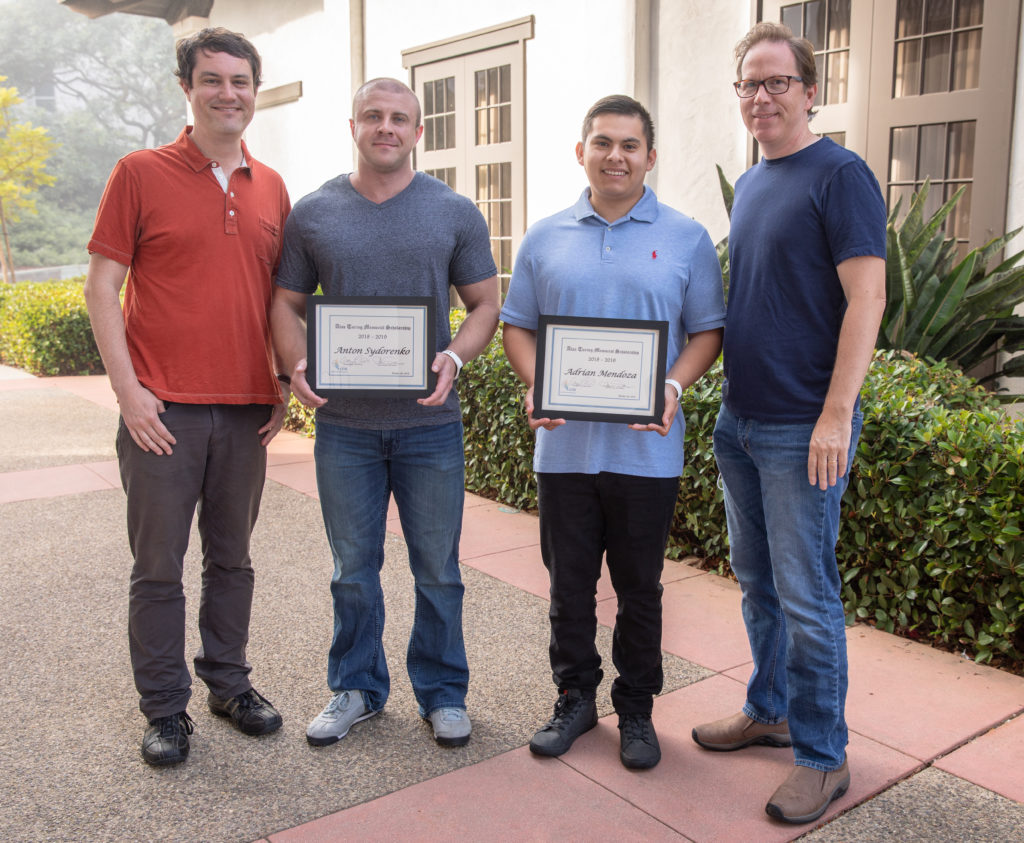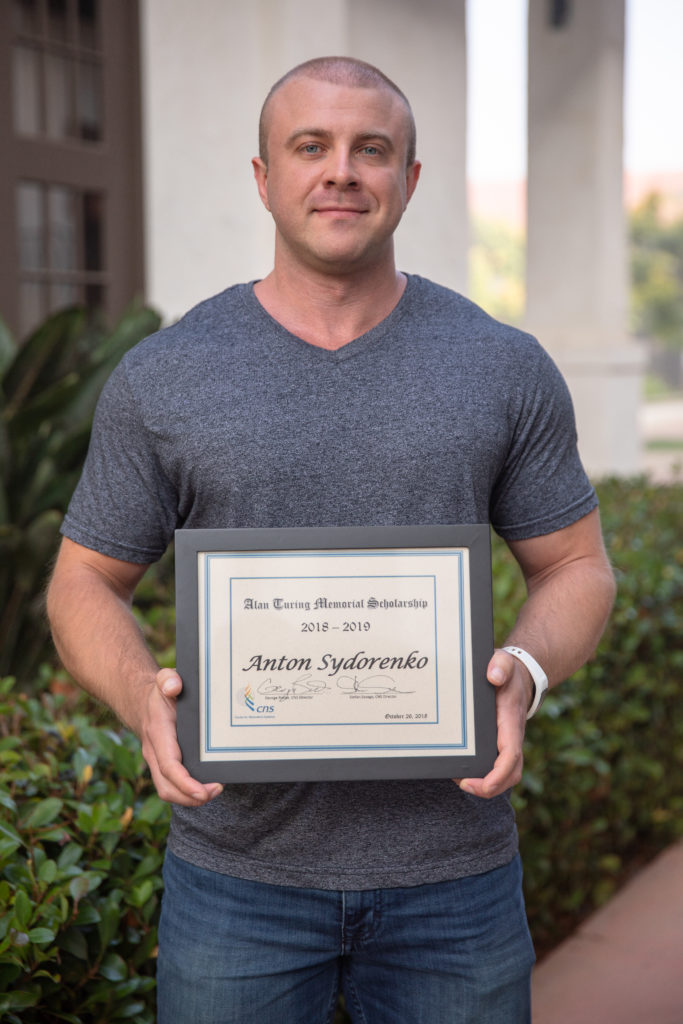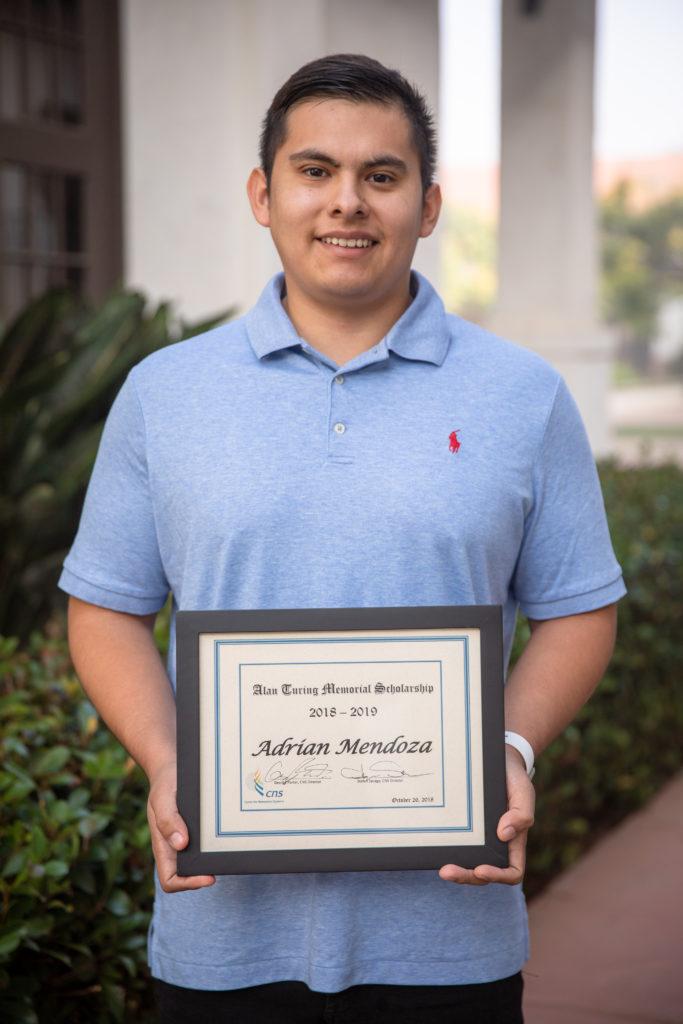Alan Turing Memorial Scholarship Recognizes Two Students in Computer Science
By Xochitl Rojas-Rocha, senior writer, Qualcomm Institute at UC San Diego
The recipients of this year’s Alan Turing Memorial Scholarship are Anton Sydorenko (senior, Computer Science) and Adrian Mendoza (junior, Computer Engineering). This marks the third consecutive year that UC San Diego’s Center for Networked Systems has recognized students studying networked systems for their academic commitment and involvement in the LGBT community, and the first year that it has awarded the scholarship to more than one student.

Honoring Alan Turing’s Legacy
The Alan Turing Memorial Scholarship was established in 2015 by the Center for Networked Systems (CNS), an interdisciplinary computer science research center in UC San Diego’s Computer Science and Engineering Department. The scholarship pays homage to Alan Turing, the famed codebreaker and mathematician whose work accelerated the Allied victory in World War II by more than a year.
After the war, Turing was persecuted for his orientation as a gay man. He died by suicide in 1954.
“The Turing Scholarship at UCSD is a unique way that we as a community show how much we value diversity, in particular, diversity aimed at the LGBT community. Diversity is essential to strengthening our center, and is in line with UCSD’s mission,” said CNS co-director George Porter.
The Turing Scholarship highlights CNS’s interest in celebrating and promoting student diversity in computer science and related fields. In addition to providing students with funds for their education, CNS offers recipients a chance to conduct research under the guidance of a mentor. Thanks to a donation of $10,000 from the Motorola Solutions Foundation, CNS can provide that opportunity to two recipients this year.
“The Motorola Solutions Foundation is honored and privileged to support the Alan Turing Memorial Scholarship,” said Matt Blakely, executive director of the Motorola Solutions Foundation. “We believe in organizations that are fostering innovation, building partnerships and driving change, and we’re proud to be a part of the positive impact they’re making in their communities.”

Anton Sydorenko: Immigrant, Coder
When he was 20, Anton Sydorenko packed a bag of summer clothes and emigrated alone from Ukraine to Chicago, IL. He had only $700 in his pocket.
Sydorenko’s first years in the country were spent adjusting, practicing his English, and working minimum wage jobs to support himself. One of those jobs entailed working security at a popular LGBT nightclub in Chicago, where he found friends and a community. He participated in LGBT-geared festivals and helped build a float for a pride parade on one memorable occasion.
Eventually, Sydorenko’s hard work carried him from community college to a transfer to UC San Diego. It felt like a significant achievement for someone whose parents never attended school. Sydorenko believes it was made possible by the risk he took in moving to a new country where he had neither friends nor family.
“You really have to experience the poverty, obstacles and total corruption of ‘developing’ countries to truly appreciate and respect ‘the land of opportunities.’ Two years ago I became a U.S. citizen and it is one of my proudest achievements,” said Sydorenko.
The scholarship will support Sydorenko’s education and love of coding. For him, “receiving an award that is named after Alan Turing, the father of computer science, is especially motivating and inspiring.”
Currently, Sydorenko and several classmates are designing an app that will help find homes for animals held in shelters.
Adrian Mendoza: First-Generation Student, Computer Engineer

Born to Mexican immigrants in south Los Angeles, Adrian Mendoza credits his parents and the hard sacrifices they made for his current success and the opportunity to pursue what he loves. To him, computer engineering is a way to understand and solve the problems of the world.
“Technology revolves around everyone’s life, so working to improve technology is basically working to improve everyone’s life,” Mendoza concluded.
In addition to leading independent projects in computer engineering, Mendoza fosters collaborations between the Society of Hispanic Professional Engineers and Out in Science , Technology, Engineering, and Mathematics (oSTEM), an LGBT-oriented non-profit. He has seen his efforts help oSTEM build its reputation and draw interest from engineering students who identify as LGBT.
Receiving the Alan Turing Memorial Scholarship gives Mendoza the space to focus on his studies, and removes the added stress of working to support himself. As soon as he’d heard he won, he called his family.
“It took me a couple minutes to let it sink in that I was the fortunate student to have been awarded this scholarship, out of the hundreds who applied for it. At the end of the day, I felt blessed and thankful for having been selected,” said Mendoza.
The scholarship is open to undergraduates who are active supporters of the LGBT community and majoring in computer science, computer engineering, public policy, communications, and other programs touching on networked systems. It is awarded to students based on academic merit, with a preference for those with demonstrated financial need.
The CNS established the scholarship with gifts from the center’s annual giving fund. The center is now looking for additional philanthropic support to create an endowment, in hopes of raising $250,000 to ensure the scholarship will be available to students in the future.
If you are interested in donating to the foundation, contributions can be made online .
For more information on the scholarship and the application process, visit the CNS website .
The story is also posted here: UCSD CSE
